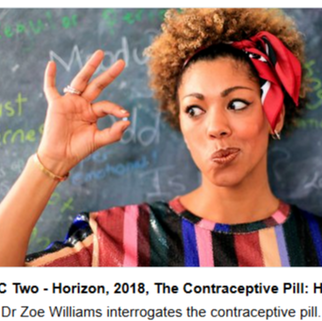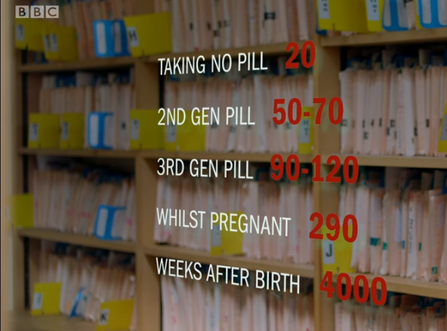
I was nervous about this programme. A doctor, on the BBC, talking about pill safety - it’s bound to dismiss women’s concerns, isn’t it?
So I was pleasantly surprised when there was no lecture telling all women they should use a long acting method like the implant, injection or coil.
Instead Dr Williams simply says most women prefer the pill to long acting
So I was pleasantly surprised when there was no lecture telling all women they should use a long acting method like the implant, injection or coil.
Instead Dr Williams simply says most women prefer the pill to long acting
methods of contraception and skipped the lecture.
I was also pleased the mental health problems associated with the pill were not dismissed.
The programme quoted the official statement that this is an association rather than a causal link, AND they took concerns seriously. Brilliant stuff.
As well as the Danish study (hurrah for massive data sets), I think this was thanks to the journalist Vicky Spratt - who was also part of the programme - and to Holly Grigg-Spall for her “pillsplaining” article and her book Sweetening the Pill.
Libido concerns were also taken seriously. They interviewed women about their experiences and had a sympathetic researcher – Dr Cynthia Graham - talking to them about the impact of the pill.
Cancer is where things got more complicated.
For pill users, there is a small increase in breast cancer risk. At the same time, the pill protects against less common cancers.
Overall the lifetime risk of cancer is the same for pill users and non-users, which is reassuring.
However, I felt uncomfortable when they discussed these statistics with a young woman who had lost her mother to breast cancer, asking her “what do you think now?” after telling her all the stats.
That did not feel appropriate.
But my biggest disappointment was the way the programme discussed the risk of blood clots – something which concerned 48% of women in their survey.
It would have been wonderful if they could have continued with the approach used for mental health and libido and listened to women who had experienced blood clots.
I would have welcomed that alongside a calm and clear explanation of the risk and what symptoms to look out for.
Unfortunately, instead of hearing from women, we only heard from clinicians.
One spoke about the alarming increase in the abortion and unplanned pregnancy rates after the 1995 pill scare, and another clinician spoke about how he treats treats blood clots and mainly sees pregnant women.
The statistics weren't great either. There was a huge emphasis on the risk of blood clots while pregnant - and in the weeks following birth.
The way the information was presented made it difficult to understand that the pill causes up to one extra case of blood clots per thousand women per year, depending on the kind of pill used*.
The message was simple. Don’t panic, there's a small increase in risk but it’s better than the alternative - which is pregnancy. As if non-hormonal contraception doesn’t exist, and no woman would think a maximum risk of one in a thousand is acceptable.
I was not surprised that the programme assumed all women want to avoid periods – many clinicians seem to think this.
One woman I spoke to said her doctor made her feel “old-fashioned” for wanting periods. Yes there’s some hassle involved, but many find them reassuring.
And I was not surprised that the programme didn’t consider alternatives to the pill for contraception, or for treating heavy and painful periods and acne.
Or the potential health benefits – like avoiding osteoporosis - of not putting our ovaries to sleep.
Still, this is a very watchable programme. Here’s the link again.
Read more:
* Blood clots stat of up to one extra case of blood clots per thousand women per year is based on the stats in the programme at 21:11. To make the numbers easier on the eye, I made it per 1,000 women. The actual additional cases of blood clots that can be attributed to the pill each year are between 0.3 and one per thousand. Here's a screenshot of the programme stats for info. These are per 100,000 women.
I was also pleased the mental health problems associated with the pill were not dismissed.
The programme quoted the official statement that this is an association rather than a causal link, AND they took concerns seriously. Brilliant stuff.
As well as the Danish study (hurrah for massive data sets), I think this was thanks to the journalist Vicky Spratt - who was also part of the programme - and to Holly Grigg-Spall for her “pillsplaining” article and her book Sweetening the Pill.
Libido concerns were also taken seriously. They interviewed women about their experiences and had a sympathetic researcher – Dr Cynthia Graham - talking to them about the impact of the pill.
Cancer is where things got more complicated.
For pill users, there is a small increase in breast cancer risk. At the same time, the pill protects against less common cancers.
Overall the lifetime risk of cancer is the same for pill users and non-users, which is reassuring.
However, I felt uncomfortable when they discussed these statistics with a young woman who had lost her mother to breast cancer, asking her “what do you think now?” after telling her all the stats.
That did not feel appropriate.
But my biggest disappointment was the way the programme discussed the risk of blood clots – something which concerned 48% of women in their survey.
It would have been wonderful if they could have continued with the approach used for mental health and libido and listened to women who had experienced blood clots.
I would have welcomed that alongside a calm and clear explanation of the risk and what symptoms to look out for.
Unfortunately, instead of hearing from women, we only heard from clinicians.
One spoke about the alarming increase in the abortion and unplanned pregnancy rates after the 1995 pill scare, and another clinician spoke about how he treats treats blood clots and mainly sees pregnant women.
The statistics weren't great either. There was a huge emphasis on the risk of blood clots while pregnant - and in the weeks following birth.
The way the information was presented made it difficult to understand that the pill causes up to one extra case of blood clots per thousand women per year, depending on the kind of pill used*.
The message was simple. Don’t panic, there's a small increase in risk but it’s better than the alternative - which is pregnancy. As if non-hormonal contraception doesn’t exist, and no woman would think a maximum risk of one in a thousand is acceptable.
I was not surprised that the programme assumed all women want to avoid periods – many clinicians seem to think this.
One woman I spoke to said her doctor made her feel “old-fashioned” for wanting periods. Yes there’s some hassle involved, but many find them reassuring.
And I was not surprised that the programme didn’t consider alternatives to the pill for contraception, or for treating heavy and painful periods and acne.
Or the potential health benefits – like avoiding osteoporosis - of not putting our ovaries to sleep.
Still, this is a very watchable programme. Here’s the link again.
Read more:
- For more about mental health and the pill see The Independent.
- For more about blood clots and the pill see the NHS website.
- A potential fix for period pain
* Blood clots stat of up to one extra case of blood clots per thousand women per year is based on the stats in the programme at 21:11. To make the numbers easier on the eye, I made it per 1,000 women. The actual additional cases of blood clots that can be attributed to the pill each year are between 0.3 and one per thousand. Here's a screenshot of the programme stats for info. These are per 100,000 women.
